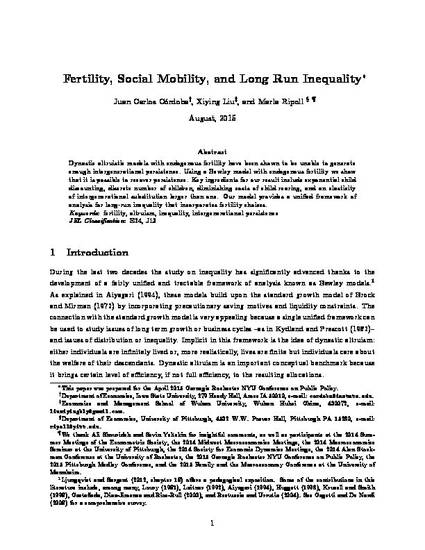
Article
Fertility, social mobility and long run inequality
Journal of Monetary Economics
Document Type
Article
Disciplines
Publication Version
Submitted Manuscript
Publication Date
2-1-2016
DOI
10.1016/j.jmoneco.2015.10.007
Abstract
Dynastic altruistic models with endogenous fertility have been shown to be unable to generate enough intergenerational persistence. Using a Bewley model with endogenous fertility we show that it is possible to recover persistence. Key ingredients for our result include exponential child discounting, discrete number of children, diminishing costs of child rearing, and an elasticity of intergenerational substitution larger than one. Our model provides a unified framework of analysis for long-run inequality that incorporates fertility choices.
Copyright Owner
Elsevier B.V.
Copyright Date
2016
Language
en
File Format
application/pdf
Citation Information
Juan Carlos Cordoba, Xiying Liu and Marla Ripoll. "Fertility, social mobility and long run inequality" Journal of Monetary Economics Vol. 77 (2016) p. 103 - 124 Available at: http://works.bepress.com/juancarlos-cordoba/11/

NOTICE: this is the author’s version of a work that was accepted for publication in Journal of Monetary Economics. Changes resulting from the publishing process, such as peer review, editing, corrections, structural formatting, and other quality control mechanisms may not be reflected in this document. Changes may have been made to this work since it was submitted for publication. A definitive version was subsequently published in Journal of Monetary Economics [77, (2016)] DOI: 10.1016/j.jmoneco.2015.10.007.